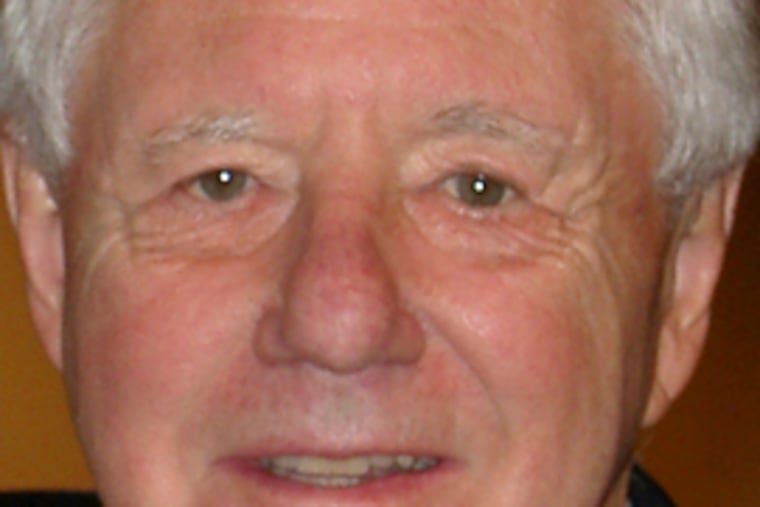Luigi Mastroianni Jr., 83, fertility pioneer
Luigi Mastroianni Jr., 83, a highly respected reproductive endocrinologist - he was head of obstetrics and gynecology at the University of Pennsylvania, performed the first in-vitro fertilization in Philadelphia, and advanced research of the contraceptive pill - died of heart failure Nov. 25 at home in Haverford.

Luigi Mastroianni Jr., 83, a highly respected reproductive endocrinologist - he was head of obstetrics and gynecology at the University of Pennsylvania, performed the first in-vitro fertilization in Philadelphia, and advanced research of the contraceptive pill - died of heart failure Nov. 25 at home in Haverford.
Dr. Mastroianni had a series of heart operations for a congenital disease in the last 26 years.
After a lifetime of researching and teaching reproductive medicine to countless doctors worldwide, Dr. Mastroianni returned to Penn as a student two years ago to see how his philosophical and ethical teachings on fertility were being perceived.
"He wanted to know what people were thinking about the complex ethical issues he worked on over the years," said his daughter, Anna, who teaches health law and bioethics at the University of Washington. "He was an innovator with a conscience."
After 62 years as a researcher and teacher, Dr. Mastroianni earned a master's degree in bioethics from Penn in May.
In 1946, he received a bachelor's degree in zoology from Yale University in his hometown of New Haven, Conn., where his parents practiced obstetrics and gynecology for more than 50 years. He earned a medical degree in 1950 from Boston University. He completed an internship and a residency in obstetrics and gynecology at Metropolitan Hospital in New York, then a fellowship in fertility and endocrinology at Harvard University and the Free Hospital for Women in Boston.
After five years of teaching at Yale, Dr. Mastroianni became professor of obstetrics and gynecology at the University of California, Los Angeles, and chief of obstetrics and gynecology at Harbor Hospital in Los Angeles.
In 1965, he was named chairman of obstetrics and gynecology at Penn. During his 20-year tenure, he established the division of reproductive biology and the division of human reproduction. Considered one of the best research facilities in women's health, it is a top-funded program by the National Institutes of Health. "He was passionate about helping young doctors succeed," said Christos Coutifaris, chief of Penn's division of reproductive endocrinology and infertility. "Even if he spearheaded a project, he gave the credit to others. It was not about him."
In the early 1950s, Dr. Mastroianni worked with John Rock, one of the inventors of the birth-control pill, and in 1959 gave sex researchers William Masters and Virginia Johnson their debut public forum at a fertility conference.
In 1983, he performed the first successful human in-vitro fertilization in Philadelphia, said Deborah Driscoll, chairman of obstetrics and gynecology at Penn.
Many women who became mothers because of Dr. Mastroianni's research were so grateful that they named their children after him.
"We used to laugh at how many babies around the world had Luigi as their middle name - including some from Japan," his daughter said.
In 1989, in recognition of their contributions to in-vitro fertilization, Dr. Mastroianni and Robert Edwards of Cambridge University shared the prestigious King Faisal International Prize in Medicine. (Edwards and Patrick Steptoe were responsible for the birth of the first in-vitro baby, Louise Brown, in 1978.)
"My father had a gift for translating complex science and controversial reproductive issues so people could understand," his daughter said. "For this reason he was a trusted source by government and appeared on Barbara Walters,
60 Minutes
or quoted in Time, Newsweek, and other mainstream publications."
In 1993, he was inducted into the Institute of Medicine of the National Academy of Sciences. That same year, Penn created the Luigi Mastroianni Jr. Professorship in Obstetrics and Gynecology. In 1998, Penn established the Luigi Mastroianni Jr. Clinical Innovator Award, and he was given the Lindback Award for Distinguished Teaching. He was on the board of counselors for the National Institute of Child Health and Human Development.
In addition to his daughter, Dr. Mastroianni is survived by his wife of 51 years, Elaine C. Pierson Mastroianni, also an obstetrician and gynecologist; sons John and Robert; seven grandchildren; and a sister.
Services will be private.